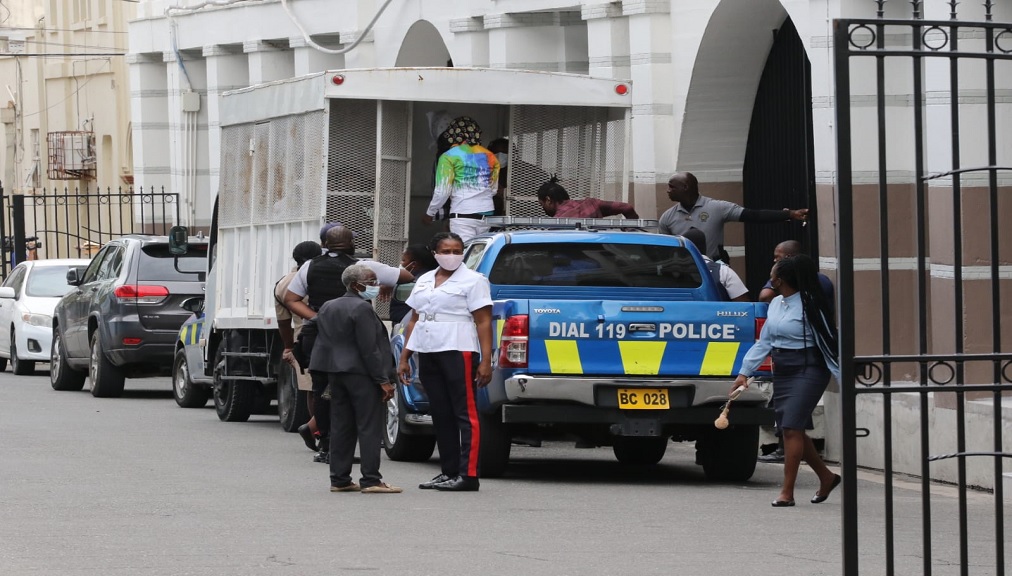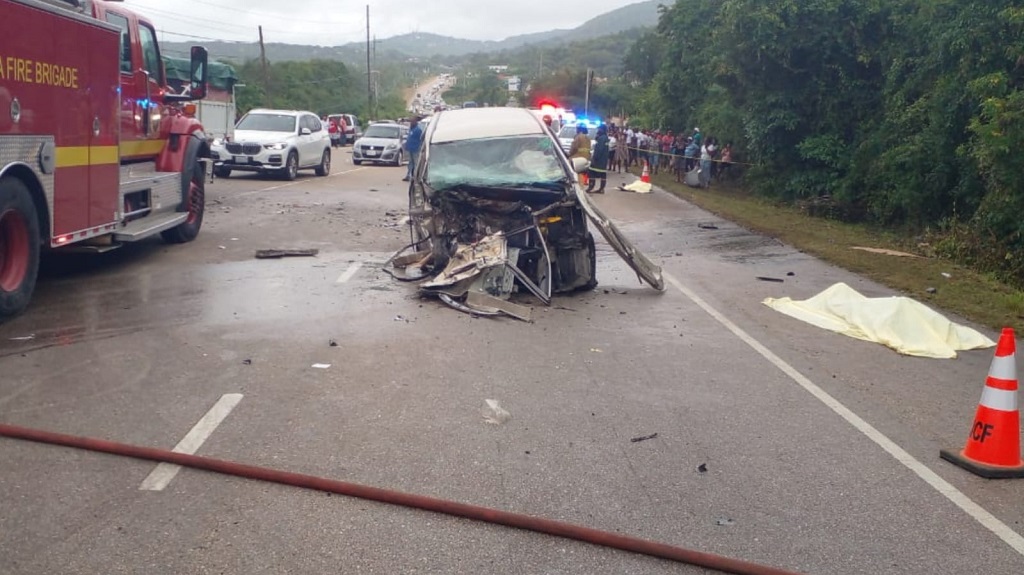With months to go before the 15 convicted members of the Spanish Town, St Catherine-based One Don faction of the Clansman gang are sentenced, there is already much conversation about the likely prison time for each convict.
The Andre ‘Blackman’ Bryan-led notorious gang wreaked havoc throughout St Catherine and, in at least one case, St Andrew, leaving a trail of violence and bloodshed.
Looking on, law enforcers are keenly watching how Chief Justice Bryan Sykes will determine what sentences are to be handed down after considering mitigating and aggravating factors relative to each accused and the case.
The 15 convicts, including Bryan, were largely being tried under the Criminal Justice (Suppression of Criminal Organisations Act), 2014, better known as the anti-gang legislation, on an indictment containing several counts, including murder and arson.
The offences were committed between January 1, 2015, and June 30, 2019, mainly in St Catherine, with at least one murder committed in St Andrew.
An outline of some of the sentencing ranges for the offences – typically the highest applicable sentences – is carried below:
The sentencing hearing is scheduled to commence on July 3.
Being a gang leader – maximum 30 years
Earlier this month, Bryan was convicted of being the leader of a criminal organisation.
The anti-gang legislation states that “on conviction on indictment in a Circuit Court”, the relevant maximum sentence is “imprisonment for a term not exceeding thirty (30) years.”
Members of a gang
For being a member of a criminal organisation, the legislation states that a person can be sentenced to “a term not exceeding twenty (20) years” for the first offence”.
According to a legal source, this sentence would apply to a convict’s “first criminal offence” in general.
The legislation further states that for “second or subsequent offence, imprisonment for a term not exceeding twenty-five (25) years.”
The legal source, an attorney, reminded that, “When you’re being sentenced, your antecedents, your social enquiry report, etcetera”, will be considered.
“If that discloses that you are a habitual offender – that is, you have been convicted before – then it would be your second offence,” he stated, adding that the term of imprisonment for the second offence under the Act would be applicable.
In relation to the One Don faction of the Clansman gang, those individuals who have been convicted of being members of a criminal organisation are: St Thomas pastor, Stephanie ‘Mumma’ Christie; former Jamaica Defence Force (JDF) soldier, Jermaine Robinson; Bryan’s cousins, Tomrick Taylor; Tomrick’s brother, Roel Taylor; and one of Bryan’s bodyguards, Dylon McLean.
Also convicted of being members of the gang are: Jahzeel Blake, Michael Whitely, Lamar Simpson, Tareek James, Fabian Johnson, Joseph McDermott, Andre Golding, Bryan Morris, and Ted Prince.
Commission of crimes
Some of the convicted gangsters were found guilty of facilitating the commission of serious offences, including murder and arson of a dwelling place. Those offences would fall under section six of the anti-gang legislation.
“So, they (the convicted gangsters) are not necessarily charged for the murder of the person. The murder is a separate trial, but the sentence would be murder in the context of a gang,” the attorney stated.
“So, it’s a Section six offence, and… for your first offence, sentence is maximum of 20 years, and second offence, maximum of 25 years.
“The sentence that is applicable to murder would not apply in this instance, because they are not charged for the substantive murder,” the legal source said.
For instance, Andre ‘Blackman’ Bryan, Dylon McLean, Tareek James and Blake were found guilty of count seven on the indictment, which is “facilitating applicable offence by a criminal organisation, contrary to Section 6(1)(b) of the Criminal Justice (Suppression of Criminal Organisations) Act.”

Specifically under count seven, they were guilty of facilitating the commission of a serious offence in the murders of Jermaine Bryan and his girlfriend, Cedella Walder, in ‘Fisheries’ or ‘New Nursery’ in Spanish Town, St Catherine in September 9, 2017.
Instead of facing a life sentence, which is usually given to persons convicted of murder after a trial, the men will likely face being sentenced to a maximum of 20 or 25 years in prison, based on the first or second offence under the section of the Act that outlines the maximum penalties to be imposed by a judge.
Other mitigating and aggravating factors would determine whether the sentence for each convict goes up or down.
“These persons facilitated the murder in the context of the gang, and that is why they are being (or will be) sentenced in the context of a gang, which is like a 20 or 25 years,” said another attorney.
Bryan, McLean, James and Blake were also found guilty of knowingly facilitating the commission of an applicable offence by a criminal organisation, the arson of a dwelling place relative to the killing of Jermaine Bryan and Cedella Walder.
The sentence of between 20 to 25 years maximum applies to that offence under the anti-gang legislation.
Similar sentence ranges face Bryan and others for facilitating the commission of other offences.
Bryan was solely found guilty of facilitating the commission of a serious offence in the murder of a supermarket worker identified as ‘Doolie’.
Doolie, whose real name is Damaine Forrester, was murdered in August 2017, reportedly because of his perceived association with the then Tesha Miller-led faction of the Clansman gang.
The gun murder occurred before a prominent wholesale establishment on Chancery Street in St Andrew.
Bryan and Tareek James were found guilty of facilitating the commission of the murder of a man called ‘Outlaw’, whose real name is Patrick Tulloch, in Lauriston, Spanish Town, St Catherine on November 2, 2017.
Bryan and James were also convicted of knowingly facilitating the commission of an applicable offence by a criminal organisation, in the conspiracy to murder ‘Outlaw’.
The chief jurist said he was convinced that Bryan, Brian Morris and Michael Whitely “are guilty” of facilitating the commission of the murder of a Rastafarian deportee on Jones Avenue in Spanish Town, St Catherine on January 14, 2018.
Bryan and Ted Prince, alias ‘Mawga Man’, were convicted of facilitating the murder of an unknown man outside Phil’s Hardware store in Spanish Town, St Catherine in 2018.
The 20 to 25-year maximum sentence range applies for all those convictions, but the ultimate decisions reside with Sykes.
Sole gun convict
The gang leader’s cousin, Roel Taylor, was the sole person convicted of illegal possession of firearm and illegal possession of ammunition.
An Ak-47 rifle and ten 7.62 millimetre rounds of ammunition were found at Taylor’s shop on Jones Avenue in Spanish Town, St Catherine in 2019.
He was charged and convicted under Section 20(1) (b) of the Firearms Act.
The statutory maximum sentence is life imprisonment, but the normal range, as outlined by the sentencing guidelines used by judges for that section of the Act, is seven to 15 years.
The starting point for the sentence is usually 10 years.
Concurrent sentences
The two attorneys reminded that with some of the convicted gangsters being convicted of more than one offence, the sentencing judge will determine whether the sentences are to run concurrently or otherwise, as he deems fit under the law.
The attorneys also reminded that the sentences or penalties could not possibly reflect the legislation that deals with the “predicate offence”.
Shared one of the attorneys: “Many may feel that having been charged under the anti-gang law in terms of, for example, facilitating the commission of a serious crime, whether it is murder or arson, that the sentence would have reflected the penalties for, example, murder.
“The section of the anti-gang law under which they were tried and convicted is what will determine the sentences.
“A judge couldn’t revert and say, ‘Okay, let me convict this person to life (imprisonment) for murder’, but he wasn’t charged with murder and a murder sentence wouldn’t apply, based on my reading of the legislation,” she said.
A similar view was given by another local attorney.
“So, when they charge you in the context of the anti-gang or the Criminal Justice (Suppression of Criminal Organisations) Act, the sentences that flow are those that are applicable to the particular offence.
“If it’s a section six offence (under the Act), then it’s a section six penalty,” he stressed.










